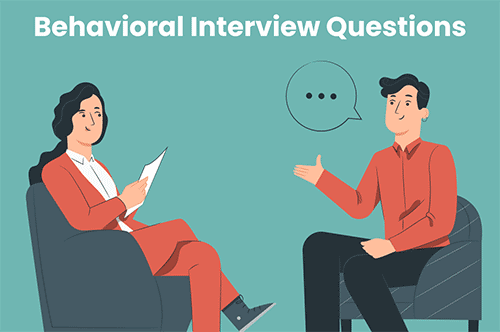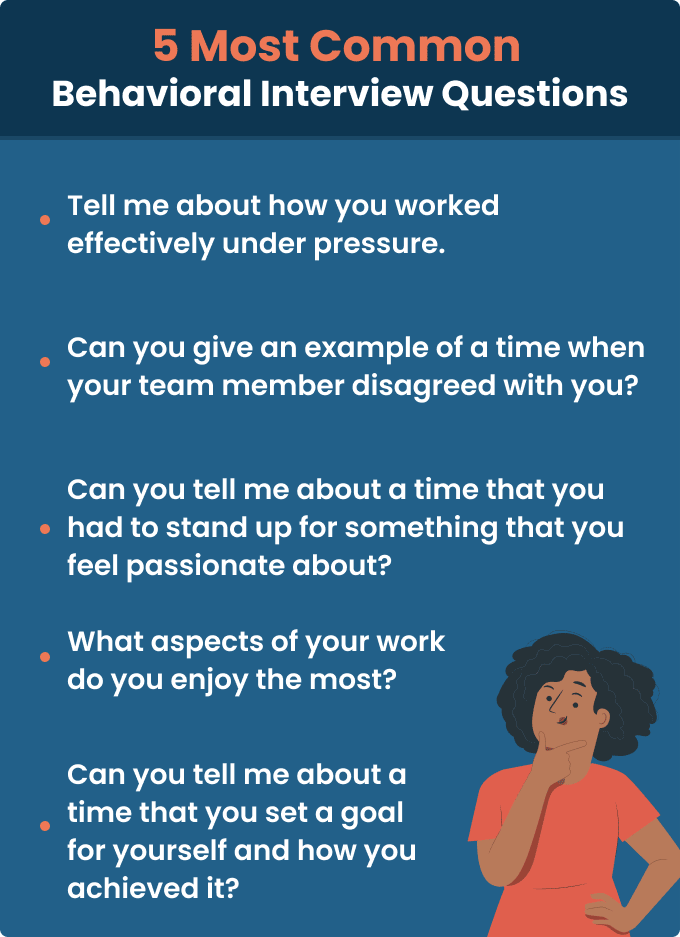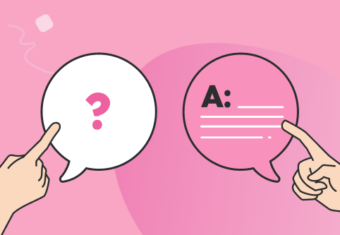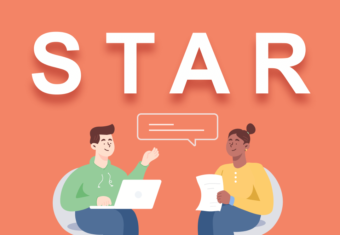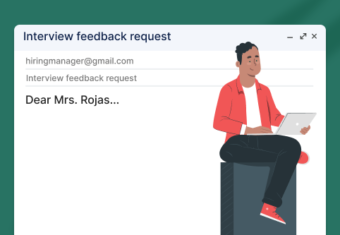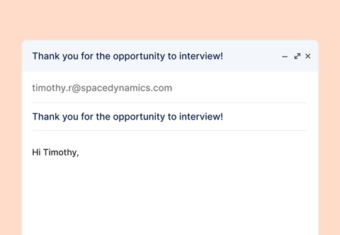Behavioral interview questions focus on you and your experiences. This can make them challenging to answer because they require more thought than other types of interview questions. However, all the information you need to answer them is in your head – you just need to prepare a bit ahead of time.
In this article, we dive into the most common behavioral interview questions asked by employers and explain how to answer them the right way.
What are behavioral interview questions?
Behavioral interview questions are a type of interview question that focus on how you handled different situations in the workplace, and – more importantly – what those situations reveal about your behavior, skills, and experience.
Unlike regular interview questions like “Why do you want to work here?“, behavioral interview questions ask you to describe a real-life situation and how you used specific skills (usually soft skills) to resolve a problem or accomplish something. Your answer should be structured as a short story or personal anecdote that highlights how you used your talents to achieve something at work.
Interviewers love behavioral interview questions like “tell me about a time you failed and how you overcame it,” because they reveal what kind of skills you have as a candidate, and how you would react if a similar situation came up at the position you’re interviewing for.
Top behavioral interview questions and answers
Here are 35 examples of the most common behavioral interview questions used by interviewers, categorized according to which soft skill they relate to:
Communication behavioral interview questions
These questions are designed to reveal how strong your communication skills are at work:
1. Can you tell me about a time when you disagreed with someone at work and had to persuade them to see things from your perspective?
2. Describe a time that you gave a successful presentation at work.
3. Can you tell me what your communication process is like with your manager and if you think it’s effective?
4. Tell me about a time that you had to deal with a difficult client or customer and how you communicated the company’s policy to them.
5. Can you tell me about an example of when you had to break some bad news to someone and how you handled the situation?
Example
Question: Tell me about a time that you had to deal with a difficult client or customer and how you communicated the company’s policy to them.
Answer
In my current role as a customer support specialist, I’m responsible for addressing customer concerns and processing refunds. We once had an upset customer who wouldn’t leave the store. She wanted to return an item she had just bought, and when I told her we don’t accept returns on items that are on sale, she started getting verbally aggressive.
I remained calm and once again explained our policy, but she wouldn’t accept it. To de-escalate the situation, I offered to let her exchange the item she had bought for something else. Once she calmed down, she accepted that solution and actually ended up becoming a returning customer.
Adaptability behavioral interview questions
Being able to adapt quickly to new challenges is a skill that’s valuable for nearly any job. The following behavioral interview questions are commonly asked by employers trying to gauge how adaptable you are:
6. Can you tell me about your process for adapting to remote work over the pandemic? Were there any particular aspects you struggled with, and how did you overcome those issues?
7. Explain a time when you had to deal with a situation that was outside the scope of your job’s regular responsibilities and how you handled it.
8. Describe a time when your company or the overall market was undergoing changes and how you adapted to those changes.
9. Can you describe a time that you had to adapt to a new technology or process for your work? What challenges did you run into and how did you overcome those issues?
10. Tell me about a time that you ran into an unexpected obstacle at work and how you managed to overcome it.
Example
Question: Can you tell me about your process for adapting to remote work over the pandemic? Were there any particular aspects you struggled with, and how did you overcome those issues?
Answer
Initially, I found it difficult to adjust to working remotely. I was struggling to stay on task when I was working from home because I got distracted easily. I tried a few different methods to solve the problem, and what ended up working best for me was to create a strict routine for myself and stick to it.
I started waking up half an hour early so that I could make a schedule for the day. This helped me manage my time better. I also made sure to go for a walk during lunch to get some exercise and a change of scenery, which helped me avoid getting distracted in the afternoon.
Time management behavioral interview questions
Time management is a useful skill no matter what job you have. These behavioral questions are meant to reveal how strong your time management skills are in a professional setting:
11. Can you give me an example of a time when you had many different responsibilities to juggle and how you managed to prioritize your time?
12. Tell me about a time that you had a lot of tight deadlines that you needed to meet. How did you manage the situation and make sure everything got done?
13. Can you describe a long-term project that you managed and how you made sure you stayed on track?
14. Tell me about a time that you set a goal for yourself and how you achieved it.
15. Sometimes it’s not possible to get everything done in a day. Can you describe the last time you failed to achieve something because of time constraints and what you think went wrong?
Example
Question: Tell me about a time that you set a goal for yourself and how you achieved it.
Answer
When I started my last job, I set a goal for myself to be promoted to assistant manager within a year of being hired. I achieved this by proving that I was capable of managing people and projects, and by consistently exceeding my goals and objectives.
I always offered to take on extra assignments and new challenges and also made an effort to learn as much as possible about the company and the industry. My supervisors noticed my dedication and rewarded me with a promotion.
Teamwork behavioral interview questions
Whether you work in a restaurant or in an office, teamwork skills are essential for getting things done and keeping everything running smoothly. Interviewers will typically use the following behavioral interview questions to get a read on if you’re good at working with others as a team:
16. Can you give an example of a time when your team member disagreed with you and how you dealt with that situation?
17. Tell me about a time you had to compromise with your coworkers to achieve something.
18. Tell me about a time you had a conflict at work, or worked on a team with someone you personally found difficult, and how you overcame that conflict.
19. Can you tell me about a time when a team member wasn’t pulling their weight on a project and how you handled it?
20. When was the last time you had to work with others as a team to accomplish something? Can you describe your role and what you contributed?
Example
Question: Have you ever had to work on a team with someone you personally found difficult? How did you overcome that conflict?
Answer
At my previous job, I had to work on a team with someone who was very competitive and always wanted to be in charge. This person would constantly argue with me and other members of the team and would never take any feedback or criticism. At first, I found it difficult to collaborate with them, and our work suffered as a result.
However, by making the effort to get to know my coworker better, I realized that they weren’t being difficult on purpose. They just took their work very seriously and wanted the entire team to do well. I tried to be more clear in my communication and explain my ideas more thoroughly, which helped me gain their trust. After this, the project went a lot smoother.
Conflict resolution behavioral interview questions
Employers are always looking for candidates who can diffuse tense situations and help people arrive at solutions that they’re happy with. These questions are frequently asked by interviewers to get insight into your conflict resolution skills:
21. Can you tell me about a time that you had to stand up for something that you feel passionate about?
22. Have you ever disagreed with your manager about something? How did you handle that disagreement?
23. Tell me about a time you were in conflict with a coworker or colleague and how you resolved it.
24. Have you received negative feedback about your performance or work before? How did you handle it?
25. Tell me about a time you had to deal with an unhappy customer or client and how you resolved the issue.
Example
Question: Have you received negative feedback about your performance or work before? How did you handle it?
Answer
Once during a performance review my manager informed me that while my work was good, I needed to work faster to ensure that other members on the team who relied on me would meet their deadlines.
I hadn’t realized that this was an issue, so I was grateful that my manager told me. To tackle the problem, I started asking for clearer expectations and communicated more frequently with the other team members. I also worked on my organizational skills, which helped me become more efficient at work.
Motivation behavioral interview questions
Self-motivation and a strong work ethic are two qualities that employers always want in their employees. However, these qualities are very difficult to communicate through a resume and cover letter.
That’s why hiring managers commonly ask these behavioral interview questions to get a better understanding of your motivation and values:
26. Can you tell me about a time when you did everything you could but still failed to achieve what you wanted to accomplish? Why do you think that happened and what did you learn from that experience?
27. What aspects of your work do you enjoy the most?
28. What is your greatest accomplishment? What are you most proud of?
29. Can you describe a time that you noticed an issue and took initiative to solve it?
30. What management style do you think works best for you?
Example
Question: What management style do you think works best for you?
Answer
I find that a hands-off management style suits me best. Too much micromanagement makes me feel stressed, so I work well with managers who give me the space to do my job but are available if needed. I like to have the freedom to make my own decisions and come up with my own solutions. When I’m given clear goals and then allowed to figure out the best way to achieve them, I’m a lot more motivated and productive.
Leadership behavioral interview questions
If you’re applying for a management-level position, your interviewer will want to know all about your leadership skills. The following behavioral based interview questions are designed to get a clearer picture of your leadership abilities:
31. Can you tell me about a time you had to have a difficult conversation with someone you managed?
32. Give an example of a time you had to accomplish a task that you didn’t have prior experience with. How did you approach the situation?
33. Describe a time that you felt challenged as a manager. What do you think you learned from this experience?
34. Has an employee ever come to you with concerns? How did you handle that situation?
35. Can you give an example of when you delegated successfully in order to complete a project?
Example
Question: Has an employee ever come to you with concerns? How did you handle that situation?
Answer
In my current position, I’m responsible for managing a small team of six marketing coordinators. Last year, I had an employee message me to ask for a meeting. She was concerned that her position wasn’t offering enough career opportunities and asked me what she needed to do to gain a promotion. As a manager, I think it’s important to reward people who want to excel in their careers. So I started mapping out a process for her to take on more responsibilities. She quickly progressed and started to gain more autonomy in her role, eventually getting promoted to a management position the next year.
How to answer behavioral interview questions using the STAR method
Now that we’ve gone over some of the top behavioral interview questions, it’s time to learn how to answer them.
Here’s a quick TikTok example of what the STAR method looks like in an interview:
@resumegenius How to answer “Tell me about a time you made a mistake at work” using the STAR method in an interview! #starmethod #interviewtips #interviewtip #interview2023 #jobinterview #jobinterviewtips #resumegenius ♬ original sound – Resume Genius | Career Advice
While there’s no one way to answer a behavioral question because they all require you to talk about a situation from your own life, you can structure your response using the STAR method.
The STAR method is an interview technique that breaks your response into four parts, providing context to employers about the:
- Situation or problem you faced
- Task you were involved in
- Action you took to complete the task
- Result or positive outcome from your actions
The STAR method is particularly helpful for answering behavioral interview questions because it provides lots of context for the interviewer. Plus it helps you keep your answer focused and concise.
Here’s an example of how to answer a behavioral interview question using the STAR method:
Can you tell me about a time when you had to accomplish something under pressure?
Situation: Sure, I think I actually work well under pressure. In my last position as a marketing manager, I was responsible for approving changes to the website as well as writing and editing new content.
Task: My second year into the job, I was tasked with overseeing the launch of our company’s new website. Everything was going smoothly until our company’s profits dipped because of the pandemic. In an effort to turn things around, management moved the deadline for the website’s launch up by two months.
Action: Obviously, this put quite a bit of pressure on me. To make sure things stayed on schedule, I asked a few of my coworkers to put their less time-sensitive tasks on the back burner and created a team focused on getting the new website up and running. Additionally, I hired and trained four new freelancers to help streamline the editing process and help me publish new content faster.
Result: It wasn’t easy, but by prioritizing resources and working as a team, we were able to more than double our output in a short period of time. We ultimately were able to meet the new deadline for the website and made sure everything was properly QA’d before launch.
Other interview resources
Behavioral interview questions are just one part of preparing for your next interview. Ready yourself for whatever the interviewer might ask with the resources below:
Click to rate this article
4.4 Average rating


